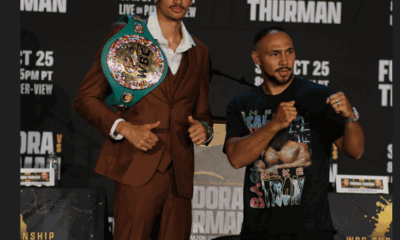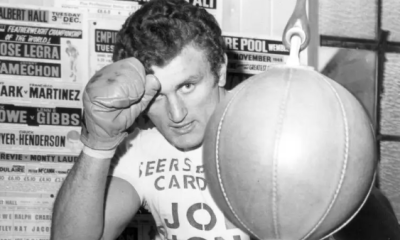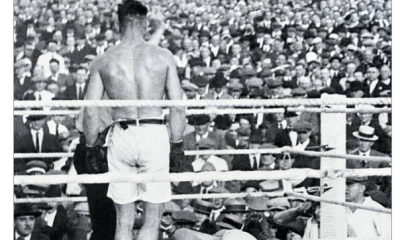Featured Articles
Boxing and the Splendor of Cuban Sports: An Interview with Author Tim Wendel
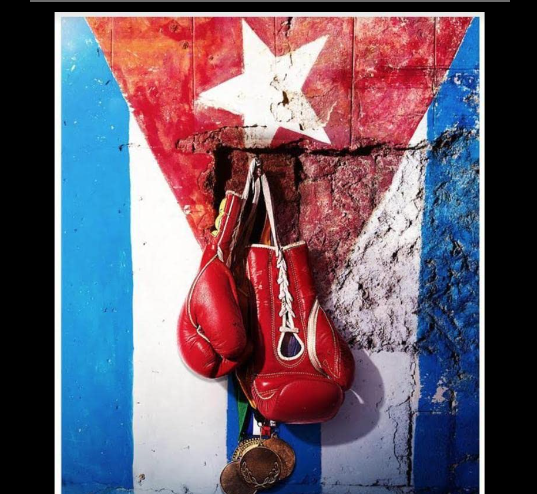
Boxing and the Splendor of Cuban Sports: An Interview with Author Tim Wendel
Cuba is an island nation of roughly 11.4 million inhabitants and while sugar and cigars are major exports, superb athletes aren’t very far behind.
Known as a longtime baseball hotbed, the island has produced countless individuals who played and shined in the major leagues. Not to be overlooked is that Cuba has also given the world some of the best boxers ever to slip on a pair of gloves.
A partial list of standouts includes Teofilo Stevenson, Felix Savon, Kid Gavilan, Jose Napoles, Kid Chocolate, Sugar Ramos, Benny Paret, Joel Casamayor, Erislandy Lara, Guillermo Rigondeaux, Yuriorkis Gamboa and Yordenis Ugas.
That’s a mouthful and then some.
Tim Wendel, a Baltimore, Maryland-based writer in residence at Johns Hopkins University and one of the founders of USA Today Baseball Weekly, has visited Cuba four times. Though baseball is Wendel’s specialty, he’s also familiar with the gloved warriors.
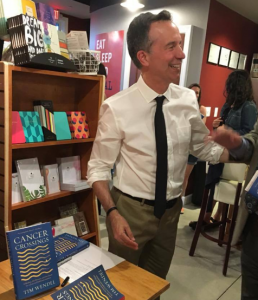
Tim Wendel
Why has Cuba, despite its small population been so successful in producing so many outstanding athletes?
“Sports provided a way for Cuba to compete and even excel on the international stage. Baseball and such Olympic sports as boxing and track and field were emphasized by the Castro government. It helped that Fidel Castro, the island’s longtime dictator, loved sports, starred at basketball, ping-pong and baseball as a schoolboy,” explained Wendel, who has published 14 books including several works of fiction.
“I had fun teasing out the “what-if” aspect of the latter in my first novel, “Castro’s Curveball.” Winning gold medals and doing well in such international competitions as the World Baseball Classic was a way for Cuba to stand out. In addition, Cuba often had the domestic situation to develop stellar athletes. An understanding of a particular sport was regularly handed down from parent to child, as well as team allegiances. For example, if older members of a family were fans of the Habana Lions, once one of the fabled winter ball teams, the children would likely be Lions fans, too.”
And there have been plenty of incentives for athletes to excel on the world stage.
“More importantly, performing well against the rest of the world was a way for an athlete to help his or her family,” said Wendel, who earned a bachelor’s degree in journalism and a minor in English from Syracuse University and a master’s degree in fiction writing from Johns Hopkins University. “For decades, the best apartments and automobiles, what little the island nation had, or the government could provide, went to the best athletes.”
Stevenson, a three-time Olympic gold medalist who recently passed away, never fought professionally.
“It’s unfortunate that Stevenson never boxed against the best. I believe that’s why many baseball players have opted to defect,” Wendel said. “They want to test themselves against the best. Stevenson would have done well against Muhammad Ali, Joe Frazier and the other elite boxers from the 1970s and 1980s. Unfortunately, politics derailed what could have been some epic bouts.”
Recently the Cuban government has allowed its boxers to leave but in turn they would have to hand over a significant portion of their purse. What’s Wendel’s opinion on this matter?
“The new policy is better than nothing. They started to take a similar approach with baseball about 10 years ago and it allowed some of the top athletes in that sport to have more control over their affairs, make some money, and see more of the world,” he said. “But having a significant portion of their earnings going back to the government sends the wrong message. If the Cuban government believes this will stop or delay their top athletes from defecting, they are misjudging the situation. The more the Cuban athletes hear about how professional sports works in the rest of the world, especially the U.S., the more they want to be a part of it.”
Wendel said there’s something about athletic excellence that any fan, Cuban or otherwise, can appreciate.
“The Cuban people, like sports fans anywhere, enjoy watching excellence and that’s been the island’s legacy for many decades,” he pointed out. “The success of Stevenson eventually led to fellow Cuban champion Felix Savon. Both of them are three-time Olympic champions.”
Many Cuban stars are more than mere athletes, they’re actors on a stage, a really big and grand stage. “A flair for the game, whether it’s in boxing or baseball or other sports, has been misunderstood over the years. Cubans, similar to athletes from other Latin American nations, love to exhibit a joy for the game,” said Wendel. “In this country, that’s sometimes mistaken for showing the other team up. But as more Latinos have played starring roles, especially in the U.S. major leagues, I believe fans and even opposing players better understand where the Latino stars are coming from. Why do they do what they do?”
Wendel focused on something with which he’s very familiar: “A decade ago, I was an advisor on a permanent exhibit at the Baseball Hall of Fame in Cooperstown,” he said. “We advocated for a screen showing a highlight loop of amazing plays by Latino stars (Roberto Alomar snaring a line drive, Omar Vizquel bare-handing a ball to save a no-hitter, etc.). That became the most popular part of our “Viva Baseball” exhibit.”
Castro was the boss of the island from 1959 until his passing in 2008. During his four trips to Cuba, did Wendel ever have a chance to speak with El Presidente?
“I never spoke with Castro, which may have been just as well. He’s a major character in the two novels I set in Havana (“Castro’s Curveball” and, most recently, “Escape From Castro’s Cuba,” the latter of which recently won an Indie Book Award). I was six rows behind Fidel at the 1999 exhibition game between Team Cuba and the Baltimore Orioles. That said, it could have been an awkward conversation.”
Wendel did however speak with a Cuban sports legend.
“Besides such Cuban ballplayers as Victor Mesa Sr. and Omar Linares, one of the most intriguing conversations I ever had about Cuba and sports was with Alberto Juantorena, who won the 400- and 800-meter races at the 1976 Olympics,” he said. “When he finished competing, he became one of Cuba’s top sports officials. We met at a reception in Havana for Olympic medalists. I wasn’t invited and got in through a back exit. “What are you doing here?” Juantorena asked me. I shrugged and then we had an enjoyable conversation about Cuba and sports.”
For decades, getting to Cuba was a difficult proposition for an American. But if you did make it there, it could be a splendid experience.
“Travel to the island got more difficult with Donald Trump as president,” Wendel offered. “In fact, the last trip I made to Havana was in early 2017 before he was sworn in. When everyday people can talk with everyday people, I believe we’re often better off than when politicians are left to dictate everything.”
“One of my best times in Cuba was walking through the old part of town, near the harbor and having a pack of kids and someone’s grandmother show me around,” he said. “In fact, the older lady insisted that the Cubans never trusted the Russians. When I asked why, she replied, “We’re better dancers.”
Wendel added: “On my four trips to Cuba, I bring along new baseballs. I’ll hand them out to the kids playing the game in alleys and backstreets,” he said. “They look at me with big eyes, like I just handed them the Hope Diamond.”
Have sports, including boxing, helped bridge the gap between the United States and Cuba?
“Yes, but we certainly have a long way to go. That said, I’m reminded of my first trip to the island, back in 1992. I was covering some exhibition games between Team Cuba and Team USA. This was a few weeks before the Barcelona Summer Olympics,” Wendel said. “First, I was so impressed with the Cuban’s caliber of play. That’s still one of the best infields, offensively and defensively, I’ve ever seen and I covered the major leagues, on and off, for 20 years.”
“Still, what I remember best about those games in Holguin, on the eastern end of the island, was this old man coming up to me in the stands. He asked me about the Minnesota Twins, who had won the 1991 World Series, one of the best Fall Classics ever, and I told him it would be difficult for them to repeat. The Twins didn’t have the largest payroll in the game.”
Wendel continued: “Undoubtedly, they would lose several stars and they did,” he said. “I was into my sports-talk radio answer when he interrupted me. “I know all that,” he said. “OK, I replied. What do you want to know? “What do they look like,” he said. “That’s when it
hit me what a star-crossed land Cuba is. Here’s this guy who knew as much about the Twins’ roster and payroll as me, but he didn’t know what they looked like.”
And because the island can be isolated from the outside world, it makes it difficult for those there to get any information.
“That’s how separated the island is from the rest of the world, especially the sports world,” Wendel said. “So, I went around the diamond, with major help from several of the other American sportswriters. We put Kent Hrbek at first base, Jack Morris on the mound and finished with Kirby Puckett in centerfield – a guy who’s difficult enough to describe in English. As I was searching for the right words, I was turning to my fellow scribes, looking out at the field. I didn’t focus on the old Cuban gentleman until I was finished. Then I turned back to him and said, “There you go. There’s your 1991 World Series champions.”
Wendel then described the man’s reaction. “The old man had tears in his eyes,” he said. “He slapped me on the shoulder and said, “Thank you. Now, I know.” With that, he disappeared into the crowd and since then I’ve never been able to get Cuba, its sports stars and its people, out of my head.”
Sports aren’t perfect and neither is boxing or baseball, but sometimes they are able to bridge gaps.
To comment on this story in the Fight Forum CLICK HERE
-

 Book Review4 weeks ago
Book Review4 weeks agoMark Kriegel’s New Book About Mike Tyson is a Must-Read
-

 Featured Articles2 weeks ago
Featured Articles2 weeks agoThe Hauser Report: Debunking Two Myths and Other Notes
-

 Featured Articles3 weeks ago
Featured Articles3 weeks agoMoses Itauma Continues his Rapid Rise; Steamrolls Dillian Whyte in Riyadh
-

 Featured Articles3 weeks ago
Featured Articles3 weeks agoNikita Tszyu and Australia’s Short-Lived Boxing Renaissance
-

 Featured Articles4 weeks ago
Featured Articles4 weeks agoKotari and Urakawa – Two Fatalities on the Same Card in Japan: Boxing’s Darkest Day
-

 Featured Articles3 weeks ago
Featured Articles3 weeks agoIs Moses Itauma the Next Mike Tyson?
-

 Featured Articles4 weeks ago
Featured Articles4 weeks agoRamirez and Cuello Score KOs in Libya; Fonseca Upsets Oumiha
-

 Featured Articles2 weeks ago
Featured Articles2 weeks agoBoxing Odds and Ends: Paul vs ‘Tank,’ Big Trouble for Marselles Brown and More


